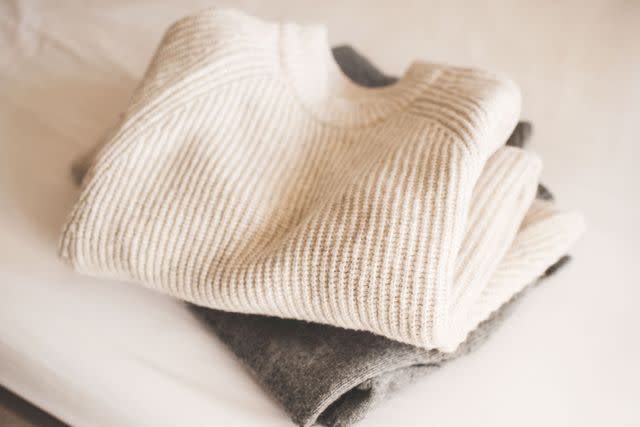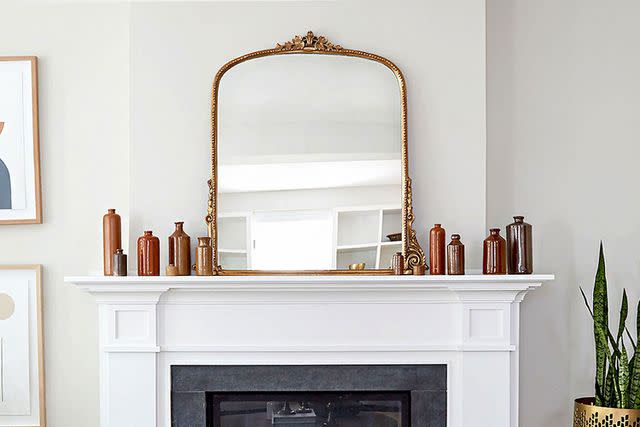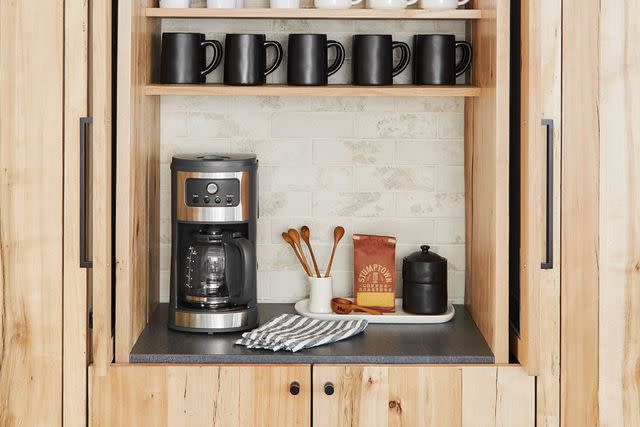10 Things You Should Never Clean With Soap—and What to Use Instead
Cleaning experts explain why you should never use soap to clean surfaces like glass, faucets, fabrics, and more.
For many of us, soap is a go-to for cleaning, and the first product we reach for to tackle cleaning jobs big and small. While it is certainly versatile, not everything can be cleaned with soap. In fact, soap can actually be damaging to certain materials. We spoke to cleaning experts to find out which household items shouldn’t be cleaned with soap—and what to use instead.
Meet the Expert
Liz Eggert, senior textile scientist, P&G Fabric Care
Mary Gagliardi (aka “Dr. Laundry”), Clorox's in-house scientist and cleaning expert
Related: 8 Household Uses for Castile Soap—the Natural, Non-Toxic Way to Clean Almost Anything
Why Soap Is a Staple for Cleaning Around the Home
Soap has been used for hundreds—if not thousands—of years for cleaning all types of materials, handwashing, and bathing. Soap is made by combining fat or oil with an alkali, a chemical compound that neutralizes acids. More often than not, soap and water is the secret recipe to effective cleaning—from dirty sneakers to outdoor furniture—and it’s easy to keep it on hand.
"Bar soap is generally best used for personal hygiene; liquid soap can be used for personal hygiene and home cleaning," says Mary Gagliardi, aka "Dr. Laundry," Clorox’s in-house scientist and cleaning expert. Soap is affordable, has many uses, and most importantly, it is an incredibly effective cleanser. It excels at removing grease, dirt, and oil from the skin and other surfaces.
Related: 21 Natural Cleaner Recipes for Every Area of Your Home

Jessica Antola
Why You Shouldn’t Use Soap to Clean Certain Items
Despite all of the benefits of cleaning with soap, there are certain scenarios in which it can actually do more harm than good. "Soapy solutions used for cleaning need to be rinsed away, and while chemically safe for surfaces, aren’t always the best choice," says Gagliardi. Synthetic detergents, both plant- and petroleum-based, are far more effective for cleaning certain types of materials and surfaces.
Water quality differs from one city or region to the next, and some areas have higher levels of calcium and magnesium present, creating what is more commonly known as hard water. Hard water reacts with soap, forming insoluble materials that ultimately leave surfaces feeling dirtier than when you started.
Things You Should Never Clean With Soap
We asked cleaning experts which items you should avoid cleaning with soap around your home, and what products to use instead.
Wool and Cashmere

Morrow Light / Getty Images
Despite popular misconceptions, wool and cashmere do not have to be professionally dry-cleaned, but you should never use soap to launder them. "These items will become misshapen and shrink," says Liz Eggert, senior textile scientist at P&G Fabric Care. Instead of using soap, opt for a good quality wool wash or hair shampoo—because, after all, wool and cashmere are hair.
Silks
Silk is another material that many believe requires professional dry-cleaning, but can actually be washed at home. However, you’ll want to wash each piece individually and use a very gentle detergent instead of soap. "Dyes used in silks tend not to be colorfast and will bleed," says Eggert. A mild shampoo can also be a good cleanser for silks.
Mirrors

Lauren Miller
Using soap and water to clean mirrors can leave visible streaks, especially if you have hard water. Depending on the surface, it could be incredibly difficult to remove this residue, says Gagliardi. Whenever you’re cleaning shiny objects, opt for specially formulated products instead of soap.
Cast-Iron Skillets
Cast-iron pots and pans are among the most durable, but soap can be potentially damaging. Soap and water can cause your cast-iron cookware to rust. It can also remove its seasoning, or the layers of oils that have accumulated over years of use that help create a smooth cooking surface. Instead of using soap, use a combination of salt and oil to remove any stubborn bits of food that are sticking.
How to Clean a Cast-Iron Skillet
Leather and Suede

Getty Images
Leather and suede can be tricky to clean due to the number of different finishes they can have. Using soap for these materials can dry them out, leading to permanent damage, says Eggert.
More often than not, you can spot treat washable leather and suede with water and a mild detergent, but be sure not to rub, as it can actually make dirt or stains harder to remove. Some leather and suede items are dry clean only while others may be labeled “not washable,” in which case it is best to abide by the manufacturer’s instructions.
The Right Way to Clean a Leather Couch
Fur
Fur coats, whether they are made from real or synthetic fur, should never be cleaned with soap. Real fur, in particular, can dry out and become damaged from laundering at home, says Eggert. Instead, have your furs dry-cleaned and allow a professional to remove any stains and avoid using soaps, detergents, or stain removers, which can cause irreparable harm to the material.
Coffee Makers

Sara Tramp-Ligorria; Design: Emily Henderson Design
Using soap in your coffee maker can lead to soapy, sudsy-tasting coffee and it can even make your coffee bubble. When you are ready to clean your coffee maker, use a mixture of water and white vinegar instead. White vinegar can help dissolve any mineral deposits in the machine without leaving a soapy aftertaste behind.
How to Clean and Descale a Coffee Maker
Towels and Absorbent Fabrics
Towels, absorbent fabrics, and laundry in general should be washed with laundry detergent instead of soap. Using soap to do laundry can make the fabric scratchy and less capable of absorbing moisture, says Gagliardi.
How to Wash Your Towels the Right Way
Windows

Dana Gallagher
Cleaning windows—or anything made of glass, for that matter—with soap and water can create a film. The levels of magnesium and calcium in your water factor into how noticeable it is, but the only way to remove it is to use a vinegar rinse to dissolve it, says Gagliardi. Instead, choose a cleaning product specifically designed for windows that does not need to be rinsed with water.
Surfaces That Need Disinfecting
While soap is effective at removing dirt and oil, most soap can’t sanitize or disinfect. Surfaces that are common touch points, like doorknobs, countertops, faucets, and lightswitches, should be disinfected regularly to prevent the spread of bacteria. Unless a soap product has an EPA registration, you’ll need to use a separate disinfectant or sanitizing product to kill germs, shares Gagliardi.
Related: How to Deep Clean Your Home in One Day—Plus, an Hourly Schedule to Help You Stay on Track
Read the original article on Martha Stewart.

